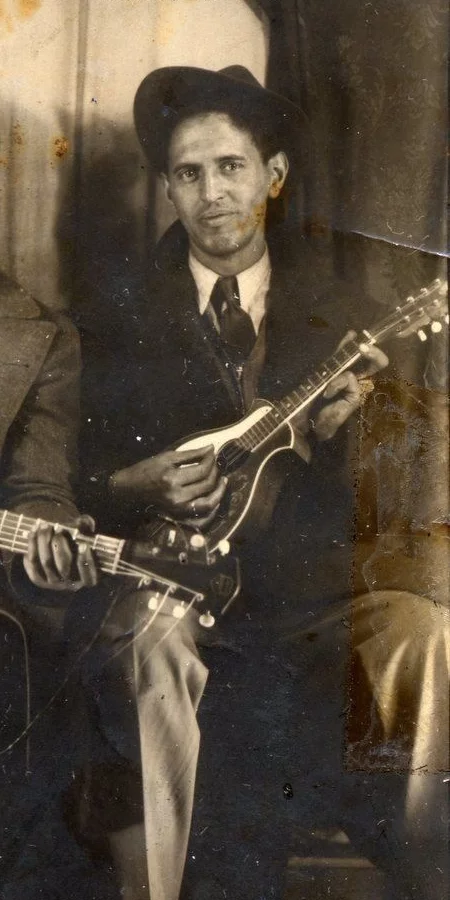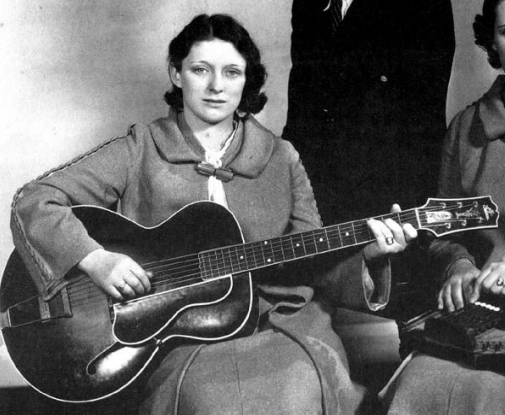Het is ondertussen al weer een paar weken geleden dat er een nieuw deel in deze reeks verscheen. Maar u bent nu net begonnen een een nieuw deeltje in deze (inmiddels behoorlijk lange) reeks. Deze keer spreekt Bill Clifton wat uitgebreider over Leslie Riddle, die een grotere rol in het ontstaan van de countrymuziek heeft gehad dan u misschien wel denkt… Veel plezier met lezen en luisteren…
Song Collecting With Leslie Riddle
Transcriptie:
 Janette wouldn’t come out then, or never did when I was there, at that particular time at least. I’m sure she did come out but not at that time. And Joe would be in and out all the time, singing and playing and keeping his dad company. That was about it but there would always be a family member. Maybe a wife of Joe, at that time Nancy was his wife, the mother of his four children. And Nancy would, if she had to, she would sit up all night and go to work the next morning at seven o’clock. You know that kind of thing. But she’d stay awake with him all night, she’s a worker.
Janette wouldn’t come out then, or never did when I was there, at that particular time at least. I’m sure she did come out but not at that time. And Joe would be in and out all the time, singing and playing and keeping his dad company. That was about it but there would always be a family member. Maybe a wife of Joe, at that time Nancy was his wife, the mother of his four children. And Nancy would, if she had to, she would sit up all night and go to work the next morning at seven o’clock. You know that kind of thing. But she’d stay awake with him all night, she’s a worker.
You talked a lot with A.P. about his song collecting, I think. I talked to him quite a bit about it. I didn’t talk to him a lot about it. He told me a lot of things. I never asked him anything but he would often teil me things. The thing I was most interested in, because of the Jim Crow attitude of the South at the time was how he got along taking Lesley Riddle along with him. Because Lesley was considered a colored man and therefore would have to drink out of the colored fountains and go to the bathroom in colored restrooms and eat in colored restaurants. And how could they travel together? And it was very difficult of course but A.P. would always find him a bed with some black family. I think it was always with a black family.
And was A.P. the one making the arrangements or did Leslie Riddle do that himself? A.P. would always try to make the arrangements. I mean, I guess the two of them always talked to the people but A.P would initiate that. He always wanted to make sure that Lesley had a good place to stay at night. And they usually ate with families but the white families didn’t invite Lesley to eat with them so A.P. would make that arrangement ahead of time, try to find a black family in the area. So I do know that much about his song collecting and I know that he collected stuff just out of people’s piano benches. I mean, where they had sheet music in the piano bench? He would ask if they had any old sheet music and they would open that bench and ‘well, yeah, they had these and they didn’t play them anymore or listened to them anymore. Did he want some of those?’ He always offered to pay for everything, as is the custom in Poor Valley. I mean, everybody there, I don’t care what you do for anybody, even if you offer somebody something, out of your own self and say ‘here, can you use this?’. ‘Well, how much do you want for that?’ I mean; ‘What can I give you for that?’ I mean, they always offered to pay. And sometimes people would accept money and sometimes they would just say: ‘well no, if you want that sheet music you go ahead and take it, that’s fine’. So, much of it he got free and much of it, most of it, I would say, he got free and occasionally he would pay a little bit of money for something.

He didn’t go around writing down lyrics of songs people sang? Well, not as a rule. There were times when that was appropriate and Leslie would hear the tune and learn the tune and learn to play it on guitar and he would write down the words. And they did do that occasionally. And sometimes they brought them back that way and Leslie would have to sit with Maybelle and play the guitar and, of course Maybelle learned how to play the blues-style of the guitar, the picking style that she uses on, well, ‘Cannonball Blues’ is the most famous one I guess, hut also she used it on ‘Mid The Green Fields Of Virginia’, on the RCA Victor recording of that. I asked her to play that one time in Newport, Rhode Island at the Newport Folk Festival in 1963. I said: ‘Maybelle can you show us how you did ‘Mid The Green Fields Of Virginia?’ and she immediately began to play it in the style that she normally played in, without remembering that she had done it in that style that Leslie Riddle had taught her. When I reminded her she said: ‘Oh, did I do it that way?’ And then she could do it that way, all right; she just didn’t remember that she’d done it that way.
Amongst themselves they call that ‘The Carter Scratch’, isn’t it? Yeah, that’s right, yeah. Yeah, and she, I mean, her style was so unique on everything but what Lesley Riddle taught her was totally unknown of in the white musical circles, nobody played that kind of guitar.

Zomoar eem een gedachte. Ze hadden in de joaren 50/60 veul meer gebroek kinnen moaken van/over de soamenwaarken mit A.P. Carter en Leslie Riddle gezien de rassenscheiding discussie van toun. Zo’n unieke soamenwaarken woar zulke mooie muziek oet votkommen is.
Denk ik ook. Vond het een mooie ontdekking en heb met veel plezier allerlei muziek van Leslie Riddle beluisterd gisteren.
Dank voor het interessante artikel! Iets anders: Warren Blair vroeg me net of ik foto’s heb van hun tournee en optreden in Nederland van de Bluegrass Unit, met Wyatt Rice, Kevin Church en Jimmy Gaudreau. Ik heb ergens een video, geen foto’s… hij zoekt iets voor een artikel over hem in de komende Bluegrass Unlimited. Als je iets hebt, graag naar mijn email adres. Hartelijk dank, hartelijke groeten, Dennis
Hoi Dennis, ik heb er even over na zitten denken, maar ‘k ben bang dat ik je niet helpen kan. Ik kan me niet herinneren een optreden van deze drie mannen gezien te hebben. Jimmy Gaudreau heb wel ooi in Harpel gezien als onderdeel van Spectrum…
Dank je voor jouw snelle reactie Harry! Fijne dag nog, hartelijke groet uit Hallstatt.